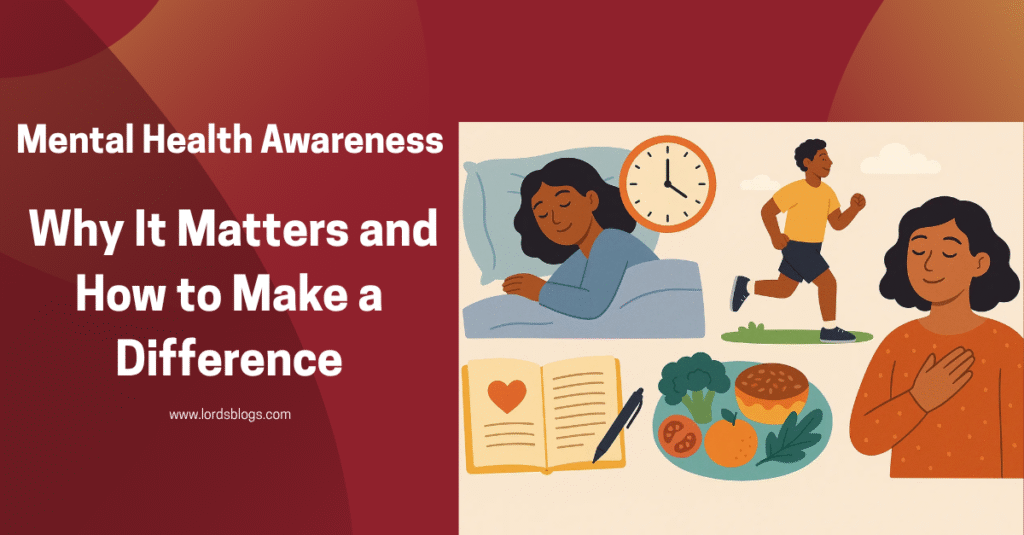Introduction
Mental health is often overlooked, yet it impacts everything from physical health to productivity and relationships. With depression and anxiety on the rise worldwide, the lack of emotional awareness can leave people vulnerable and unsupported. How can individuals and communities build better mental health systems, reduce stigma, and foster emotional resilience? This article explores the importance of mental health awareness, the power of self-care quotes, positive energy practices, and the role of awareness campaigns in creating lasting change.
Understanding Mental Health Awareness
Mental health awareness involves recognizing, understanding, and responding to mental health challenges. According to the World Health Organization (WHO), nearly 1 billion people globally live with a mental disorder (WHO, 2023). Raising awareness is the first step toward reducing stigma, increasing access to care, and encouraging early intervention.
A key aspect of awareness is emotional awareness—understanding and naming one’s feelings. This skill helps individuals manage stress, make thoughtful decisions, and maintain better relationships. Integrating self care quotes into daily routines like “You can’t pour from an empty cup” or “Healing is not linear” fosters a deeper connection to mental wellness.

The Role of Awareness Campaigns in Mental Health
Awareness campaigns play a vital role in shifting societal perceptions about mental illness. Movements like Mental Health Awareness Month (May) and World Mental Health Day (October 10) use educational content, social media, and storytelling to highlight real experiences.

Campaigns bring visibility to often-silenced struggles, normalize conversations about therapy, and promote tools like therapy quotes or motivational mental health affirmations. When campaigns emphasize inclusive values like body positivity and diversity, they reach a broader audience and reduce shame around seeking help.
Daily Habits That Improve Mental Health
Raising awareness isn’t enough—daily action is essential. Small, intentional changes help people maintain emotional balance. Here are effective ways to improve mental health:

- Practice mindfulness or meditation
- Set healthy digital boundaries
- Engage in creative hobbies
- Spend time in nature
- Use positive energy rituals like gratitude journaling
Incorporating motivational mental health reminders, like “You are not your thoughts” or “One step at a time,” helps sustain mental resilience. These micro-habits build long-term benefits and help individuals avoid burnout.
Therapy, Support, and Community Resources
Access to therapy is becoming more common, with telehealth services making it easier for people in remote areas or those with limited mobility. According to the American Psychiatric Association, over 37% of adults with mental health conditions in the U.S. received treatment in 2022 (APA, 2023).

Therapy quotes, such as “Therapy is not a weakness, it’s a strategy,” can motivate people to take that first step. Encouraging community participation in support groups, workshops, and awareness events enhances connection and accountability. Building community also promotes body positivity and normalizes help-seeking behavior, especially in marginalized populations.
Emotional Awareness & Detachment: Balancing Feelings Without Overwhelm
People often struggle with the idea of detaching emotionally without becoming indifferent. Learning how to not care doesn’t mean apathy—it means choosing peace over emotional chaos. Emotional regulation helps individuals react more mindfully, avoiding impulsive behaviors.

Practicing detachment can include:
- Identifying triggers through journaling
- Repeating affirmations such as “I can observe without absorbing”
- Creating healthy distance from toxic environments
This balance between emotional awareness and emotional boundaries leads to better mental health outcomes and reduces long-term stress.
Spreading Positive Energy Through Conversations and Content
Language and media shape how people perceive mental health. Using uplifting, inclusive language can increase hope and decrease stigma. Social media influencers, bloggers, and healthcare providers are increasingly sharing personal journeys through therapy quotes and motivational content.

Sharing positive energy is not about ignoring pain but offering light through the darkness. Content creators can lead by example—highlighting progress, setbacks, and everything in between. Community leaders and educators also play a critical role in shifting public opinion and promoting empathy.
FAQ: Frequently Asked Questions
Q1: What is the purpose of mental health awareness?
A1: It aims to reduce stigma, promote early intervention, and increase understanding of mental health conditions.
Q2: How can I participate in an awareness campaign?
A2: You can share educational posts, attend events, donate to mental health organizations, or talk openly about your mental health journey.
Q3: What are some self-care practices that help improve mental health?
A3: Mindfulness, journaling, digital detoxing, connecting with nature, and therapy are all beneficial.
Q4: Is it okay to emotionally detach?
A4: Yes, healthy detachment helps maintain emotional balance and prevents burnout, as long as it doesn’t become avoidance.
Conclusion
Mental health awareness is more than a buzzword—it’s a necessary movement toward a healthier, more empathetic world. Through consistent awareness campaigns, the sharing of therapy quotes, fostering emotional awareness, and spreading positive energy, individuals and communities can create lasting change. When people learn how to not care about the things that drain them and focus on what nurtures them, they unlock the door to better mental health.

